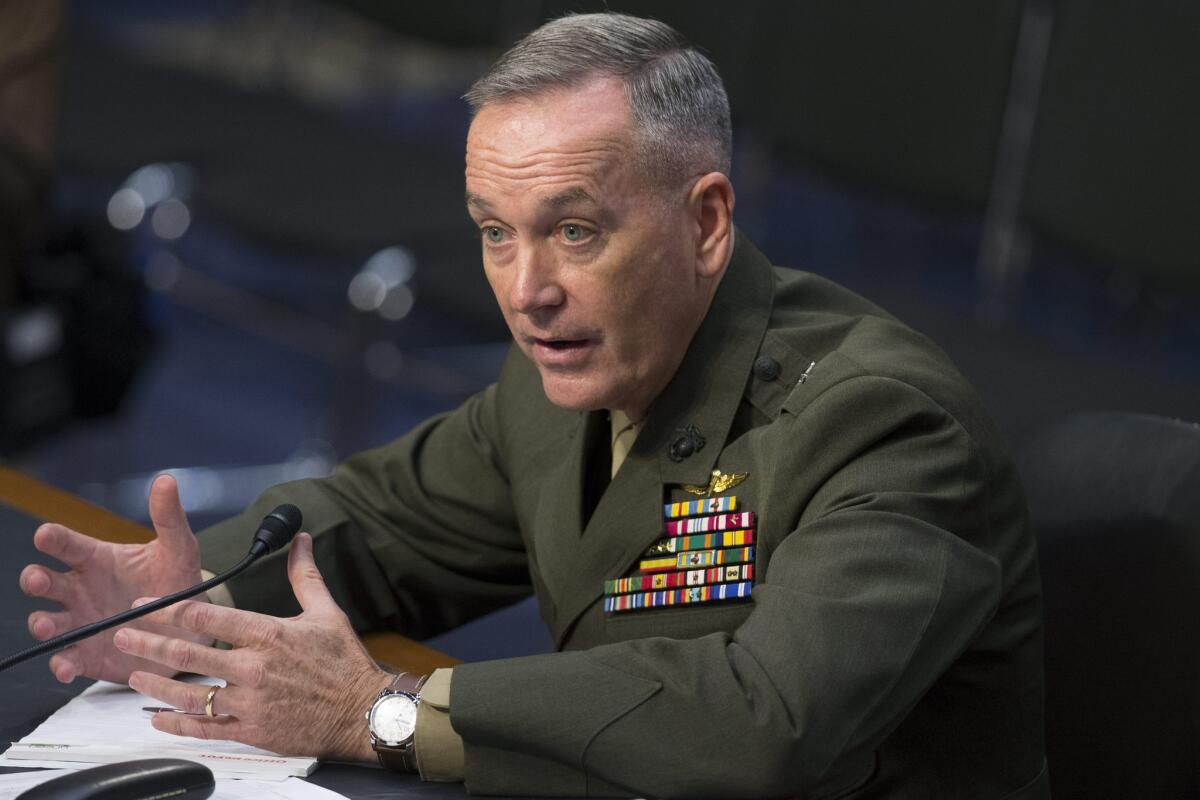Joint Chiefs nominee sails through confirmation hearing

U.S. Marine Gen. Joseph F. Dunford, Jr. appears before the Senate Armed Services Committee hearing on his nomination to be Chairman of the Joint Chiefs of Staff.
- Share via
Reporting from Washington — President Obama’s nominee as chairman of the Joint Chiefs of Staff sailed through a Senate confirmation hearing Thursday, warning that Russia poses the greatest potential threat to the United States despite the Pentagon’s air war against the Islamic State in Iraq and Syria.
“If you want to talk about a nation that could pose an existential threat to the United States, I’d have to point to Russia,” Marine Gen. Joseph F. Dunford Jr. told the Senate Armed Services Committee. “And if you look at their behavior, it’s nothing short of alarming.”
He listed Russia’s nuclear weapons arsenal, along with its annexation of the Crimean peninsula last year, and incursion into Ukraine as reasons for concern.
Dunford also said it was “reasonable” to provide lethal arms to Ukrainian government forces fighting Russia-backed separatists in eastern Ukraine, signaling a possible shift in Obama’s current policy.
Since the conflict erupted early last year, the White House has sent nonlethal aid to the embattled government in Kiev. Hawks in Congress have repeatedly urged the White House to provide “defensive weapons” to counter Moscow’s support for the separatist insurgency.
“Frankly, without that kind of support, they are not going to be able to defend themselves against Russian aggression,” Dunford said during the 2 1/2 hour hearing.
Committee members welcomed Dunford, 59, who is commandant of the Marine Corps and former top U.S. and NATO general in Afghanistan. The full Senate is expected to approve his nomination this summer.
Dunford would succeed Gen. Martin E. Dempsey, whose second two-year term as Joint Chiefs chairman is due to expire on Oct. 1.
As the nation’s top uniformed officer, the chairman oversees all Pentagon and military operations, and is military advisor to the president, secretary of Defense and National Security Council.
The Pentagon is dealing with a series of global challenges, including airstrikes against Islamic State fighters in Iraq and Syria, support for Saudi Arabian airstrikes in Yemen, and the withdrawal of most U.S. troops from Afghanistan.
At the hearing, Dunford was asked whether he believed U.S. troops should be pulled from Afghanistan by the end of 2016, as the White House has planned, or whether the drawdown should be determined by conditions.
“I can assure you if I’m confirmed I’ll provide advice to the president that will allow us to meet our current end-state goal and that’ll be based on conditions on the ground,” he replied.
Dunford said he agreed with the White House strategy of trying to build up Iraqi ground forces in the battle against extremist Sunni Muslim fighters.
Islamic State needs to be wiped out “where it takes root, be it in Iraq, Syria, or elsewhere,” he said.
Dunford also warned of what he called the “catastrophic consequences” of automatic budget cuts, called sequestration, set to go into effect this year.
“I believe we’re at the razor’s edge,” he said. “Quite frankly, if we go into sequestration we will be unable to support the current strategy that we have to protect our nation.”
On Thursday, the Army separately detailed plans to cut its force from 490,000 active-duty soldiers to 450,000 by October 2017 unless Congress appropriates more money.
The Army said funding cuts, which are being driven by budgetary restraints, are set to begin in 2016 and will affect most U.S. installations, as well as those in Italy, Germany and South Korea.
The Army said 30,000 more troops could be cut from the ranks by 2019 if sequestration goes into effect.
Born and raised in Massachusetts, Dunford was commissioned as a Marine officer in 1977. He earned a master’s degree in government from Georgetown University and a master’s in international relations from the Fletcher School of Law and Diplomacy at Tufts University.
During the assault to topple Saddam Hussein in Iraq in 2003, Dunford led the Camp Pendleton-based 5th Marine Regiment, earning the nickname “Fighting Joe.” Dunford was asked about the nickname at the hearing, but he refused to talk about it, saying he’d prefer to talk about it behind closed doors.
He served 22 months in Iraq, including as chief of staff. In 2009, he became commander of the Camp Pendleton-based 1st Marine Expeditionary Force.
In 2012, he was named to lead U.S. and NATO forces in Afghanistan. He became commandant of the Marine Corps in October.
Follow @wjhenn for military and defense info.
More to Read
Sign up for Essential California
The most important California stories and recommendations in your inbox every morning.
You may occasionally receive promotional content from the Los Angeles Times.











